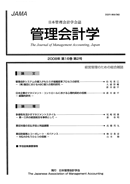
- Issue 2 Pages 3-
- Issue 1 Pages 3-
- |<
- <
- 1
- >
- >|
-
Takami Matsuo, Keisuke Oura, Kohei Arai2008Volume 16Issue 2 Pages 3-21
Published: March 31, 2008
Released on J-STAGE: March 31, 2019
JOURNAL FREE ACCESSThe purpose of this paper is to investigate the organizational change process what change took place in the way of the interpretation of the organization member in consequence of the implementation of the ABC system. We analyzed that Iida Ltd. where the profit management system based on ABC had been introduced in 1997, and the organization member’s behavior and interpretation in the implementation process were clarified by the interviews. The conceptual model by Isabella (1990) that renew Lewin model, a traditional organizational change model “unfreeze”, “change”, and “re-freeze” was adopted and verified in the analysis. Additionally, another meaning of this paper is in the point to have adopted a qualitative research method to describe the implementation of the management accounting system thought to be theoretically and technically excellent is not executed very easily, furthermore, how the organization member were puzzled, suffered, and rejected, and each one received it in the truth.
View full abstractDownload PDF (4590K) -
Kohei Arai2008Volume 16Issue 2 Pages 23-37
Published: March 31, 2008
Released on J-STAGE: March 31, 2019
JOURNAL FREE ACCESSTraditional management accounting research explored influences on individual of the performance measurement using contracting theory. However, Yokota (1998) pointed out that psychological contracts as organizational context affect a meaning of the information made by management control systems. In this paper, we investigate Yokota (1998)’s proposition. Using a survey of 128 MBA students, we found influences on individual of contents of psychological contracts
View full abstractDownload PDF (3779K)
-
Akio Ozaki, Toshiaki Sai2008Volume 16Issue 2 Pages 39-52
Published: March 31, 2008
Released on J-STAGE: March 31, 2019
JOURNAL FREE ACCESSDaiichi Sankyo Co., Ltd. is one of the largest Japanese pharmaceutical companies, which was formed by business integration between Sankyo Co. and Daiichi Pharmaceutical Co. Under this business integration process, Daiichi Sankyo has established new management style and system, which is not always based on the former companies’ traditional ways of thinking. Daiichi Sankyo aims at realization of stimulating diversification with the new management style and system, which has several unique aspects. Primarily, Daiichi Sankyo aims to achieve corporate vision by utilizing the united style and system consistently from the top management to the bottom. Secondly, through the operation under its management style and system Daiichi Sankyo emphasizes on promoting self-directed innovation and unifies the group under management policies to improve organizational capabilities. Thirdly, Daiichi Sankyo aims to create corporate value continuously by the operation of Daiichi Sankyo’s unique twelve elements of a cycle of plan-do-check-action. Fourthly, the style and the system fulfill society’s various demands and social responsibilities as a member of the society by evaluation of business procedure from the point of each stakeholder’s view. At the same time the internal control is fulfilled by operation of the same style and system. Lastly, the staff is posted in various tiers of the organization to support management for optimization as the whole, resolution of issues, and risk management.
View full abstractDownload PDF (2782K) -
Kunimaru Takahashi2008Volume 16Issue 2 Pages 53-68
Published: March 31, 2008
Released on J-STAGE: March 31, 2019
JOURNAL FREE ACCESSThis paper tests whether acquiring and target firms attempt to increase reported earnings prior to a stock for stock merger. Using a modified Jones model, discretionary accruals are examined for a sample of 298 mergers of publicly traded Japanese firms that were announced and agreed between 1999 and 2006. Findings indicate that discretionary accruals are positive and statistically significant for acquiring firms and target firms in a stock for stock merger. The results from the empirical tests indicate that acquiring and target firms’ managers manage earnings upward prior to the merger. This paper also tests whether acquiring firms create synergy to add economic values, but I can’t find the different synergy effect for the method of payment.
View full abstractDownload PDF (3273K) -
Toyohiko Hachiya, Osamu Yamamoto2008Volume 16Issue 2 Pages 69-84
Published: March 31, 2008
Released on J-STAGE: March 31, 2019
JOURNAL FREE ACCESSShareholder activism has established its citizenship in the Japanese market. In response to this, an increasing number of Japanese firms have adopted poison pills. There are two conflicting theoretical hypotheses about the effect of poison pills on shareholder value. The managerial entrenchment hypothesis predicts that adopting a poison pill will destroy shareholder value by allowing (incapable)incumbent management to self-defend. The bargaining power hypothesis predicts that adopting a poison pill will enhance shareholder value by strengthening management’s bargaining power. We analyze the information effects of poison pills using a sample of 166 adopting firms from April 2005 to July 2006. There are three key findings: i)the value effect is, on average, negligible, ii)the market values poison pills with prior shareholder consent higher than those without, iii)there exists a “learning effect” both for the market and for the adopting Japanese firms.
View full abstractDownload PDF (4621K)
- |<
- <
- 1
- >
- >|